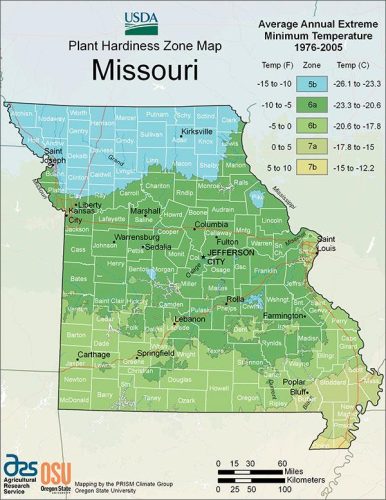Tropical Plants That Can Thrive in Missouri
Missouri’s climate is primarily humid subtropical, with a humid continental climate in some northern areas. The state experiences four distinct seasons, including hot summers and cold winters. Missouri falls within USDA hardiness zones 5a to 7a, with variations depending on the specific location within the state.

These zones help determine the types of plants likely to survive and thrive in Missouri’s climate. This article will explore the care and selection of four tropical plants—adonidia palm tree, yellow hibiscus tree, white bird of paradise, and banana basjoo—for your Missouri garden.
Missouri’s varying hardiness zones can present challenges for tropical plants, which generally prefer warmer climates. However, with proper care and attention, it is possible to grow these tropical beauties in Missouri State.
To ensure the success of your tropical plants, consider factors such as elevation, proximity to bodies of water, and exposure to wind when selecting a planting site.
Consulting with local gardening resources or experts can also provide valuable guidance on selecting appropriate plants for Missouri’s climate.
The Best Tropical Plants for Missouri
Here are our top four recommendations for your Missouri garden.
Adonidia Palm Tree
The adonidia palm tree, also known as the Christmas palm, is a popular choice for tropical landscapes due to its elegant appearance and relatively low maintenance requirements. In Missouri, it is best suited for hardiness zones 7a and warmer microclimates.
To successfully grow adonidia palms, plant them in well-draining soil and provide them with full sun exposure. During winter, protect these palms from frost by wrapping their trunks or using frost blankets, or consider planting them in containers so they can be moved indoors.
Yellow Hibiscus Tree
The yellow hibiscus tree, a vibrant tropical plant with large, showy flowers, can add a splash of color to your Missouri garden. This plant is more cold-hardy than other tropical species, making it suitable for hardiness zones 6a and warmer.
Plant your yellow hibiscus in well-draining soil and provide it with full sun exposure for the best results. In colder months, consider using a frost blanket or moving container-grown plants indoors to protect them from low temperatures.
White Bird of Paradise
The white bird of paradise, with its striking foliage and unique flower shape, is an eye-catching addition to any garden. This plant thrives in hardiness zones 7a and warmer, and it requires well-draining soil and full to partial sun exposure.
In Missouri, it may be necessary to protect the white bird of paradise from frost during winter by covering it with a frost blanket or moving it indoors if planted in a container.
Banana Basjoo
Banana basjoo, a cold-hardy banana plant, can bring a tropical feel to your Missouri garden. It can withstand temperatures as low as -10°F, making it suitable for hardiness zones 5a and warmer. Plant your banana basjoo in well-draining soil and provide it with full sun exposure for optimal growth.
To protect it during winter, mulch the plant heavily or consider constructing a temporary greenhouse or shelter around it to retain warmth.
Order from the Best Selection of Tropical Plants Online Now
For a fantastic selection of tropical plants that can thrive in Missouri’s climate, consider ordering from Tropical Plants of Florida. Our expert team can help you choose the best plants for your garden and provide essential tips for their successful growth.
One of our customers says,
Lydia, on April 18, 2023
“I recently bought some tropical plants from Tropical Plants of Florida for my Missouri garden, and I couldn’t be happier with my purchase! The staff were super friendly and helped me pick out the perfect plants for my area. My garden now looks like a tropical oasis, and I’m getting compliments from all my neighbors. Highly recommend!”
5 out of 5 stars
Visit our website or contact us to discuss your tropical plant needs and transform your garden into a lush, vibrant oasis.

